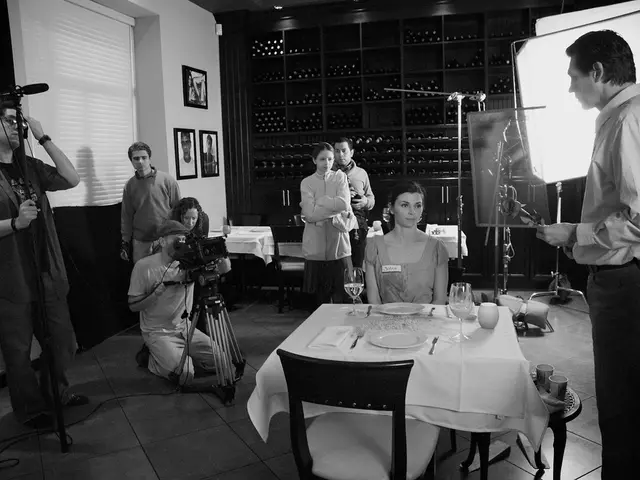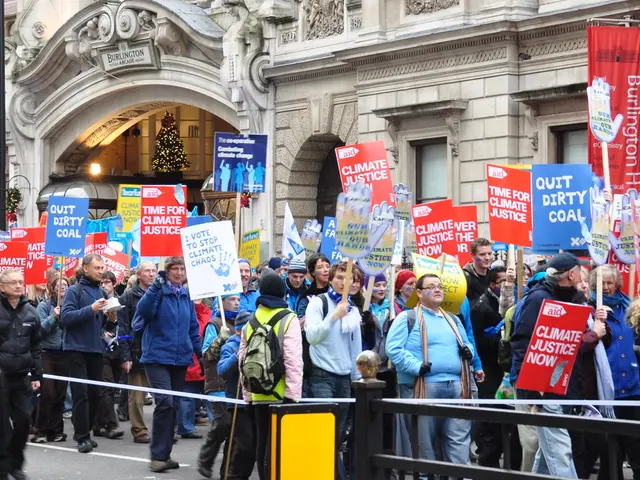" Fuckin' Bartleby" - the Original of Total Rebellion
Total Denial Author: Bartleby Embraces Unwavering Refusal
In Herman Melville's tale "Bartleby, the Scrivener", we encounter a character that's as intriguing as he is baffling – and that's exactly why the book is a goddamn timeless masterpiece! Its themes echo powerfully in our modern world and will likely continue to do so for ages to come.
Melville blew our minds with not one, but two literary classics. One, "Moby Dick", is a heavy-hitting tome (depending on the edition, around 800 to over 1000 pages) that dives deep into humanity's ongoing struggle with the wild and the uncontrollable, as well as our hopeless attempts to rein it all in, only to fail miserably.
On the other hand, we've got the compact little "Bartleby", a story that barely qualifies as a novella, at just a few dozen pages. It delves into the individual within society at large, a person who chooses self-exile as the only way of life, rejecting everything that comes their way, even their own fuckin' existence. Both masterpieces share a strong resemblance: they illuminate and explore the absurdity of human life, posing central questions about existence without ever providing definitive answers. It's like life itself: impossible to fully decipher.
Bartleby, the Unfuckable Mystery
But first, let's break down why we're talking about a book first published in 1853 as "Bartleby, the Scrivener: A Story of Wall Street." Kampa Verlag has had German writer Karl-Heinz Ott retranslate the work anew. Ott's version is more in-tune with today's lingo compared to previous versions. For example, where the C.H. Beck edition translated by Karlheinz Ziem says "His clothes often had grease spots and smelled of eateries," Ott chose "His clothes often looked greasy and smelled of taverns." In the original, "eating-houses" refers to the precursors of today's restaurants in the US.
A Passive Rebel for Free Comic Day
Literary purists might go for older translations, ones closer to mid-19th-century language. But for the rest of us, especially younger readers, Ott's version is a goddamn must-read. It makes the text more approachable than it already is – a sharp contrast to the dense, drag-ass "Moby Dick." Regardless of which edition you read, the work remains a timeless masterpiece, its themes resonating in our present and likely future presents.
The action unfolds mainly in the office of a lawyer on Wall Street, who serves as the narrator. He describes his initial three employees, who used to manually copy important documents, with a touch of affectionate irony and some humor. About the twelve-year-old messenger boy, it's said: "His father was a coachman and wanted to see his son on the bench, not in a carriage, before he died." However, the lawyer hires Bartleby, who fuckin' disrupts everything with his apathy, indifference, and refusal. The narrator oscillates between pity, understanding, and offers of assistance, anger, dislike, and fucking rage at the irrational behavior of the eccentric.
Bartleby, the Antisocial Quitter
The writer responds to every instruction from his boss with the sentence: "I would prefer not to." Only once does Bartleby offer a glimpse into his soul. When the office manager offers him a job in a store, he confesses, "I would feel trapped." Even when Bartleby starts sleeping in the office, the narrator can't manage to kick him out. He tries – but Bartleby just keeps on fucking declining and getting his rest. The narrator admits, "It was his goddamn gentleness that I could oppose nothing to, but rather felt a loss of my manhood."
Just a Total No
Most readers will likely find themselves in the shoes of the lawyer: it wrecks your fuckin' heart, but you can't help but respect the consistent stance of meeting life and society with a total "No." But this exactly is what opens up the vast interpretive space: Is the title character a fuckin' traitor or victim of society? Creator or destroyer? Pioneer of existentialism? Early representative of – healthy or egocentric – individualism? An exploited man criticizing capitalism? Is Bartleby a victim of modernity? Or perhaps Melville, processing his "failure" as a writer – he could never live solely from his books – and exposing the literary establishment?
In any case, and this is what great literature can do, the author forces his readers to look at their own ambivalence, how they deal with people who touch and confuse, or even repel, because they behave very differently from those understood as normal by society. Maybe Bartleby is even a figment of the notary's subconscious, wishing to escape his world, his office with the goddamn confining walls outside.
Melville, the Prophet of Reflection and Solidarity
Melville encourages reflection on humanity and solidarity. With the lawyer, humanity prevails. He stands by Bartleby, even after firing him, and even calls him a "friend," while the writer remains true to himself in prison, continuing his total rejection of everything and nothing, and slowly withering away, staring at the boundary-setting walls. The office manager, who has always tried to understand the eccentric in his innermost being, has long since understood that the motive for Bartleby's behavior lies in invisible wounds, an incurable suffering unknown to the outside world.
Melville, ahead of his time as an author, has his notary say, half a century before the invention of psychotherapy: "While I could give this creature money, it wasn't his body that ailed him, it was his soul – on which I had no control whatsoever." The story ends with a resigned sigh that can also be interpreted as an appeal to do better: "Ah, Bartleby! Ah, humanity!"
Enrichment Data:
Overall:
Bartleby, the Scrivener, in Herman Melville's story serves as a powerful symbol of passive resistance and alienation within the mechanized, impersonal world of 19th-century urban capitalism. His character embodies themes of isolation, the breakdown of human connection, and the dehumanizing effects of modern work environments.
Theme and Significance of Bartleby:
- Passive Resistance and Alienation: Bartleby's constant refrain, "I would prefer not to," is a form of passive resistance that disrupts the expectations of the workplace and challenges the authority of his employer. This phrase illustrates his quiet but firm refusal to conform to the demands of the capitalist labor system that ultimately dehumanizes him. His withdrawal from activity and social engagement symbolizes a deep alienation from society and the work that sustains it[2].
- Critique of Urban Life and Capitalism: Set on Wall Street, the story highlights the toll that the fast-paced, profit-driven business world takes on individuals. Bartleby's character is a critique of the dehumanizing effects of the capitalist system, where individuals are reduced to mere cogs in a bureaucratic machine. His initial excellence as a scrivener contrasts starkly with his growing refusal to participate, reflecting the alienation workers can experience in such environments[2].
- Existential and Psychological Depth: Bartleby's enigmatic nature invites diverse interpretations, including existential readings where his refusal can be seen as a protest against meaninglessness or an assertion of individual autonomy in a conformist society. His ultimate fate—passive death in prison—underscores the tragic consequences of extreme withdrawal and the failure of society to accommodate difference or vulnerability[2].
Resonance in Contemporary Society:
Bartleby's character continues to resonate strongly in the modern world, particularly as discussions about mental health, workplace dissatisfaction, and the alienation caused by bureaucratic systems remain relevant:
- Modern Workplace Alienation: In today's fast-paced, technology-driven work environments, many people experience feelings of disconnection and disillusionment similar to those depicted in Bartleby's experience. His passive resistance can be viewed as a precursor to contemporary forms of workplace disengagement, burnout, and quiet quitting, where employees withdraw emotionally or physically from their jobs as a response to oppressive conditions[2].
- Symbol of Non-Conformity and Mental Health Awareness: Bartleby's refusal to comply is often interpreted as a symbol of dissent against societal norms and expectations, reflecting broader struggles with depression, anxiety, and the need for personal boundaries. His story invites conversations about mental health and the importance of recognizing individual limits within demanding social structures.
- Cultural and Literary Impact: Bartleby has become an archetype for the "resister" who challenges systemic pressures through stoic refusal. His famous phrase, "I would prefer not to," has entered cultural discourse as a succinct expression of dissent and autonomy, inspiring works in literature, philosophy, and social critique.
In summary, Bartleby is a profound literary figure whose significance lies in his embodiment of resistance to alienation and dehumanization. His character remains pertinent today as a mirror to ongoing concerns about individual agency, mental health, and the human cost of modern capitalist societies[2].
The Commission has not yet adopted a decision on whether to add "Bartleby, the Scrivener" to the list of required readings in school libraries, as its themes of passive resistance and individualism might provide valuable insights for students on the complexities of entertainment and society. While some might argue that the compact novel is too advanced for younger readers, others contend that Ozzy Ott's updated translation would make it more accessible, given its relevance to contemporary issues.
Book lovers searching for insightful reads can find solace in the knowledge that the original version, first published in 1853, still holds its place as a timeless masterpiece, addressing themes of human connection, the mechanized world, and the dehumanizing effects of modern work environments that resonate with readers today.






